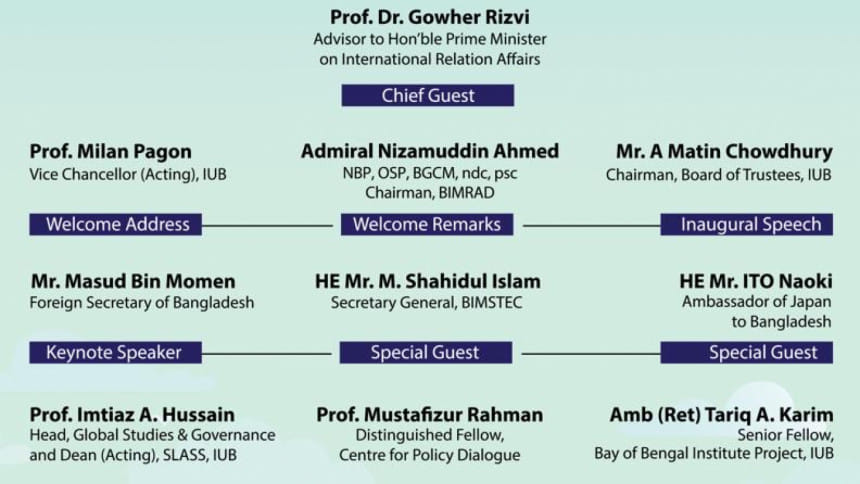IUB’s project discusses significance of Bay of Bengal in post Covid-19 world

The first of the series of webinars organised by Independent University, Bangladesh (IUB) titled, "Increasing political, ecological, economic and regional importance of the Bay of Bengal for Bangladesh in the post-Covid-19 world" took place on September 15, 2020 with a panel of experts on the issue at hand.
IUB Vice-Chancellor (acting) Prof. Milan Pagon began the event by saying that these unprecedented times have taught us all a lesson on how collaboration and evidence-based decision making is the only logical approach to combating real world issues and urges the same approach to be taken to find out more about the importance of the Bay of Bengal.
The esteemed panellists also included Masud Bin Momen, Foreign Secretary of the Government as the keynote speaker and Prime Minister's International Affairs Adviser Prof Gowher Rizvi as chief guest; Prof Imtiaz A Hussain, Dean (acting) at the School of Liberal Arts and Social Sciences, IUB; A Matin Chowdhury, Chairman of the IUB Board of Trustee; Ito Naoki, Japanese Ambassador to Bangladesh; M Shahidul Islam, Secretary General of BIMSTEC; Admiral (Retd.) Nizamuddin Ahmed; Prof Mustafizur Rahman, representative of the Centre for Policy Dialogue (CPD); and Prof Saleemul Huq, Director of ICCCAD. The event was moderated by Ambassador (Retd.) Tariq A Karim, senior fellow at the Bay of Bengal Institute Project, IUB.
The webinar discussed important qualitative and quantitative factors of the Bay of Bengal and unravelled some valuable insights on the issues and approaches required. The first issue highlighted by the officials was the lack of research and data available on the role of the Bay of Bengal. The discussion also emphasised on the sustainability factor that the future plans may require as Covid-19 has shown how important it is to keep in mind the intricacies of the environment.
Prof Imtiaz A Husain discussed the different scenarios to consider and later highlighted the implications of the steps to take. He believes that working on the issues locally and regionally will automatically lead to changes on the global level.
In his keynote speech, Ambassador Masud Bin Momen spoke about how globalisation and the rise of the two major powers, China and India, have led to the Bay of Bengal becoming of greater significance than it was before. He also reinstated the Vision 2041 and Delta Plan 2100 that has already been set in motion along with the other steps already taken to resolve issues regarding the Bay.
Two overlapping strategic processes, the US-led Indo-Pacific Strategy (IPS) and the China-led Belt-and-Road Initiative (BRI) and the four pillars, "freedom of navigations, peaceful resolution of territorial dispute in accordance with the international law, respect for sovereignty and territorial integrity and transparency in infrastructure development and responsible debt financing," were also introduced and talked about by Ambassador Momen.
Ambassador Momen then offered seven major points to discuss and consider about the issue at hand which include creating a fleet of shipping and fishing vessels to develop coastal areas, exploring the possibility of attracting economic players to set up manufacturing and containerisation facilities inside Bangladesh, exploring the possibility of centrally taking over all the major river bank systems and creating eco-friendly industrial ecosystems while preserving the essential parts of it, considering to have smart power corridors across the Bay of Bengal connecting the GBM-basin and Mekong Delta, creating a blockchain enabled platform economy system, connecting the P2P potential of the Bay of Bengal and considering preserving the skills required by engaging the youth.
Japanese Ambassador Ito Naoki stated that Japan will continue to support Bangladesh, and said that both countries share the idea of "free and open Indo-Pacific".
Chief guest Dr Gowher Rizvi commented that there is lack of research done on the Bay of Bengal, and said its resources should be harnessed for development purposes. He also mentioned about a gap between those who make policies and those who analyse then, stating the two parties do not communicate and that this culture needs a change.
The first webinar from the series ended with Ambassador Karim saying that Bangladesh can show the world how a poor country from about 50 years ago can emerge as a nation that leads the way by setting up a system of governance to harness a purpose-driven goal.

 For all latest news, follow The Daily Star's Google News channel.
For all latest news, follow The Daily Star's Google News channel. 



Comments